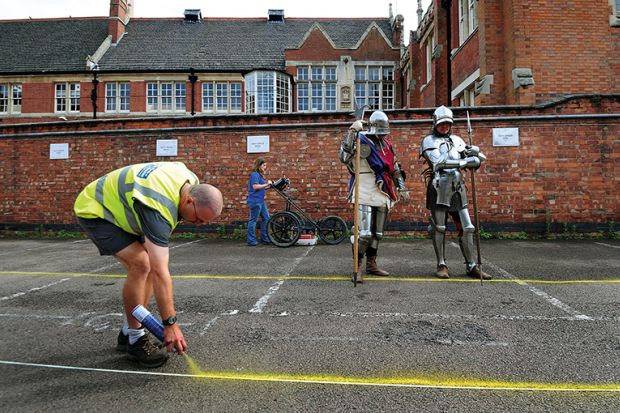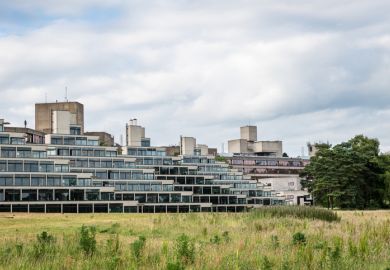The University of Leicester is just the latest in a long line of English higher education institutions to have launched restructures in the pursuit of “excellence” and, as the pandemic has wreaked havoc on campus finances, it is by no means the first to push through a programme of redundancies.
Few disputes, however, have turned as bitter as the one at Leicester, and it is the first provider since 2016 to be hit with the University and College Union’s ultimate sanction – greylisting, which asks members and other academics to refuse to interact or partner with the institution.
So what has gone wrong at a university which, less than a decade ago, was basking in the glory of its discovery of the skeleton of Richard III under a car park and had been comprehensively reshaped during the 15-year reign of vice-chancellor Sir Bob Burgess?
The story of the latest dispute began last October, when Leicester’s “Shaping for Excellence” plan proposed the restructuring of several academic and professional services units, in order to build on the institution’s “key strengths” and “remain as a leading research-intensive institution”.
Some 145 academic staff were originally put at risk of compulsory redundancy, with about 60 jobs expected to go, although this has since been reduced to 25, and some staff have already left voluntarily or accepted what the union calls “inferior” contracts.
The subjects targeted for cuts were neuroscience and psychology, management studies, languages, English, and mathematics – with a second phase expected later this year likely to affect administrative staff.
From the outset, the local UCU branch has rejected the need for job cuts, passing a vote of no confidence in vice-chancellor Nishan Canagarajah in January, going on strike for three days last month and now undertaking a marking boycott.
In the words of Leicester academics, though, discontent goes beyond the loss of jobs and reflects a wider perception of mismanagement that runs through the latest dispute and stretches back several years.
Critics have claimed that Leicester has pursued academics who were active in the union for cuts, and the targeting of researchers in critical management studies led to claims that it was an attempt to eliminate scholarship that was critical of university business models.
Nick Hartell, chair of neuroscience and one of those facing redundancy, claimed that the criteria about who was to lose their job made “little sense”.
“It seems to be about getting rid of certain people who speak out,” Professor Hartell said. “Throughout this process they have treated staff with disdain and contempt; it has been dehumanising and has been really damaging to the mental health of colleagues.”
Several scholars pointed to the retirement of Sir Bob in 2014 as a turning point. He was replaced by Paul Boyle, who is now vice-chancellor of Swansea University.
Out went an environment where staff felt they were listened to, replaced with what “appears to be a small cabal of self-styled executives who govern from afar”, one academic claimed. “Professor Canagarajah inherited an old war but has proved out of his depth at fixing it,” they said.
The financial challenges facing mid-sized research universities across England loom large in the background of the dispute: following the lifting of caps on student recruitment in 2015, many have seen their recruitment pool hoovered up by larger, more prestigious providers. At Leicester, the number of first-year undergraduates dropped by 20 per cent in the three years up to 2019-20. Meanwhile, financial statements show that Leicester’s total debt increased from £79 million in 2015-16 to £123 million in 2019-20.
Over this period, many institutions invested heavily in their estates, hoping to attract more students – with Leicester’s £500 million programme of improvements to student facilities and public spaces just one example. Latest accounts show that Leicester borrowed £25 million from the Westminster government’s Covid corporate financing facility this January, and was due to increase that to £60 million in March. Times Higher Education understands that it was one of only two universities to use the scheme.
Simon Lilley, professor of information and organisation and a member of the UCU committee, said managers “need to be transparent about what they are doing and why”.
“I do have sympathy for them having to balance the books, especially after Covid,” he said. “But cutting jobs in management or psychology – which are popular courses that don’t cost as much as science subjects to run – doesn’t make any sense,” he said.
Professor Canagarajah told THE that the university had “followed due governance” and had “worked hard to minimise the number of compulsory redundancies”.
“We want to continue to be a leading research-intensive university, one that provides an exceptional educational experience for all students and staff, now and in the future,” he said.
“The changes we are making underpin our future strategy by reshaping the university to ensure we focus our efforts where we can demonstrate excellence. The university is not in financial difficulty but we need to operate more efficiently and invest in our areas of strength and where there is student demand.”
Register to continue
Why register?
- Registration is free and only takes a moment
- Once registered, you can read 3 articles a month
- Sign up for our newsletter
Subscribe
Or subscribe for unlimited access to:
- Unlimited access to news, views, insights & reviews
- Digital editions
- Digital access to THE’s university and college rankings analysis
Already registered or a current subscriber? Login








